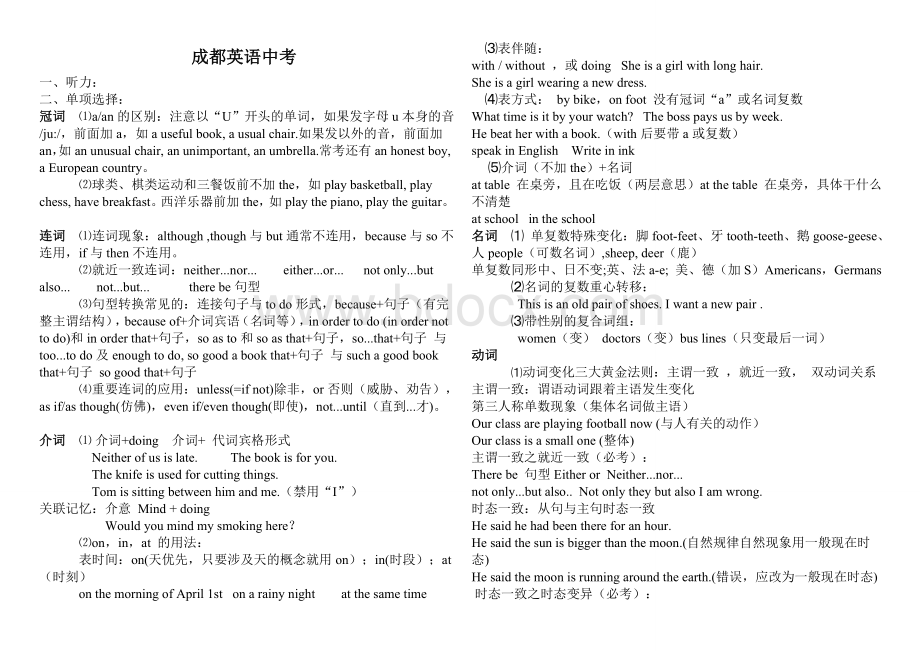成都英语中考重点.doc
《成都英语中考重点.doc》由会员分享,可在线阅读,更多相关《成都英语中考重点.doc(5页珍藏版)》请在冰豆网上搜索。

成都英语中考
一、听力:
二、单项选择:
冠词⑴a/an的区别:
注意以“U”开头的单词,如果发字母u本身的音/ju:
/,前面加a,如ausefulbook,ausualchair.如果发以外的音,前面加an,如anunusualchair,anunimportant,anumbrella.常考还有anhonestboy,aEuropeancountry。
⑵球类、棋类运动和三餐饭前不加the,如playbasketball,playchess,havebreakfast。
西洋乐器前加the,如playthepiano,playtheguitar。
连词⑴连词现象:
although,though与but通常不连用,because与so不连用,if与then不连用。
⑵就近一致连词:
neither...nor...either...or...notonly...butalso...not...but...therebe句型
⑶句型转换常见的:
连接句子与todo形式,because+句子(有完整主谓结构),becauseof+介词宾语(名词等),inordertodo(inordernottodo)和inorderthat+句子,soasto和soasthat+句子,so...that+句子与too...todo及enoughtodo,sogoodabookthat+句子与suchagoodbookthat+句子sogoodthat+句子
⑷重要连词的应用:
unless(=ifnot)除非,or否则(威胁、劝告),asif/asthough(仿佛),evenif/eventhough(即使),not...until(直到...才)。
介词⑴ 介词+doing介词+代词宾格形式
Neitherofusislate.Thebookisforyou.
Theknifeisusedforcuttingthings.
Tomissittingbetweenhimandme.(禁用“I”)
关联记忆:
介意Mind+doing
Wouldyoumindmysmokinghere?
⑵on,in,at的用法:
表时间:
on(天优先,只要涉及天的概念就用on);in(时段);at(时刻)
onthemorningofApril1st onarainynightatthesametime
⑶表伴随:
with/without,或doing Sheisagirlwithlonghair.
Sheisagirlwearinganewdress.
⑷表方式:
bybike,onfoot没有冠词“a”或名词复数
Whattimeisitbyyourwatch?
Thebosspaysusbyweek.
Hebeatherwithabook.(with后要带a或复数)
speakinEnglish Writeinink
⑸介词(不加the)+名词
attable在桌旁,且在吃饭(两层意思)atthetable在桌旁,具体干什么不清楚
atschool intheschool
名词⑴单复数特殊变化:
脚foot-feet、牙tooth-teeth、鹅goose-geese、人people(可数名词),sheep,deer(鹿)
单复数同形中、日不变;英、法a-e;美、德(加S)Americans,Germans
⑵名词的复数重心转移:
Thisisanoldpairofshoes.Iwantanewpair.
⑶带性别的复合词组:
women(变)doctors(变)buslines(只变最后一词)
动词
⑴动词变化三大黄金法则:
主谓一致,就近一致,双动词关系
主谓一致:
谓语动词跟着主语发生变化
第三人称单数现象(集体名词做主语)
Ourclassareplayingfootballnow(与人有关的动作)
Ourclassisasmallone(整体)
主谓一致之就近一致(必考):
Therebe句型Eitheror Neither...nor...
notonly...butalso.. NotonlytheybutalsoIamwrong.
时态一致:
从句与主句时态一致
Hesaidhehadbeenthereforanhour.
Hesaidthesunisbiggerthanthemoon.(自然规律自然现象用一般现在时态)
Hesaidthemoonisrunningaroundtheearth.(错误,应改为一般现在时态)
时态一致之时态变异(必考):
A——瞬间动词的-ing形式表将来
Theplaneistakingoffinanhour. Theoldmanisdying.(将要死了)
B——条件状语从句:
一般现在时表将来
Idon'tknowifhewillcometomorrow. Ifhecomes,Iwillcallyou.
IwillringyouassoonasIfinishmywork.
Iwon’tgooutuntilmyhomeworkisdone.
典型考题:
A—Iwillgoswimming. B—Ifyougo,sowillI.
双动词关系:
单句中,若有两个动词(be动词,行为动词,不包括助动词),他们的关系有四种:
and连接——动作先后或并列发生,前后形式一致
改为todo——动作未做,准备做 改为doing——动作正在做或已做
改为-ed形式——后一动作被动发生
特例:
*使、让(make,let,have)
主动不带to,被动带to
makesb.do/makesbnotdo/bemadetodo letsb.do
*Theteacheraskedthestudentstostoptalkingandtolistentoher.
*Ihavemycarrepaired.(我请人修理了我的车。
车被人修)
Ihaverepairedmycar.(我修理了我的车。
现在完成时态)
Ihavehimrepairmycar.(我让他修我的车。
Haveabdosth)
(2)动词分类与句型转换
be动词am,is,are,was,were
助动词
(1)do,does,did—帮助行为动词做句型转换
(2)have,has,had
will,would,shall,should帮助表时态
(3)can,may,must,need帮助表情态
行为动词like,cry,smile...等等(占99%)行为动词的所有句型转换均需do家族三兄弟do、does或did帮忙
Be动词、助动词不需任何帮忙
Idon'thavelunchathome.Neitherdoyou.
(前后主语不一样,Neitherdoyou主谓倒装)
Ihavebeenhereanhour.Sohaveyou.
(前后主语不一样,Neitherdoyou主谓倒装)
A—Iboughtanewbook,Tom. B—Soyoudid.(I和you指同一个人,主谓不倒装)
(3)初中重点动词短语
四个to后接—ing形式的短语(to在该短语中作介词用)
preferdoingtodoing—prefertodo prefertodoratherthando
like...betterthan... beusedtodoing(习惯于...)
usedtodo(过去通常) beusedtodo(被用来做...)
lookforwardtodoing盼望
makeacontributiontodoing采取措施/为......做贡献
重要短语或相关词
turnon,turnoff,turnup,turndowntakeoff,landon
puton,wear,dress,wearout,inred eatup,sellout,putaway,putoff
人花费
spend...(in)doingsth spendonsth
pay...for... payment报酬,repay报答
物花费
Ittakes...todo cost cost价值
speakinEnglish, sayitinEnglish,sayaword
tellastory,talkaboutsth. talkwithsb.talktosb.
(4)表事物特征常用一般现在时
Thepenwriteswell. Themusicsoundsnice.
Thefoodtastesnice.
G.形容词、副词
(1)比较 A=B
as原形as/notas(so)...as...
A>Bmore...than...比较级标志词——than A最高级
典型标志词:
in,of,among
最高级和比较级的转换:
TheChangjiangRiveristhelongestriverinChina.
TheChangjiangRiverislongerthananyotherriverinChina.
TheChangjiangRiverislongerthananyriverinIndia.
A≠B用比较级解释句子
Thisfoodisn'tsodeliciousas thatfood.
Thisfoodislessdeliciousthan thisfood.
或Thatfoodismoredeliciousthanthisfood.
必须掌握的修饰比较级的四个词:
much,alittle,even,far HeismuchtallerthanTom.
比较级、最高级的不规则变化:
口诀:
两病两多并两好,距离老远少迟到
bad/ill:
worseworst
much/many:
moremost
good/well:
betterbest far:
fartherfarthest
furt